
Particles
metrics 2024
Bridging Gaps in Physics with Open Access Insights.
Introduction
Particles is an esteemed open access journal published by MDPI, focusing on the dynamic fields of astronomy, astrophysics, and nuclear and high energy physics. Since its inception in 2019, the journal has made significant strides in contributing to scholarly discourse, achieving a commendable ranking in the Q2 category for its relevant fields as of 2023. With a commitment to disseminating high-quality research, it offers unrestricted access to a global audience, fostering collaboration and knowledge exchange among researchers, professionals, and students. Located in Basel, Switzerland, Particles serves as a platform for innovative research and discussions that leverage the latest advances in physics. Its current Scopus rankings underscore its impact and relevance, with notable positions in various categories within Physics and Astronomy. Through its rigorous peer-review process and diverse publication options, Particles continues to carve a niche in the academic landscape, catering to a growing community engaged in pioneering exploration of fundamental particles and cosmic phenomena.
Metrics 2024
 -
- 1.70
1.70 1.60
1.60 -
-Metrics History
Rank 2024
IF (Web Of Science)
JCI (Web Of Science)
Quartile History
Similar Journals
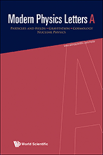
MODERN PHYSICS LETTERS A
Pioneering Discoveries in Modern PhysicsMODERN PHYSICS LETTERS A, published by World Scientific Publishing Co Pte Ltd, is a distinguished journal in the field of physics that serves as a pivotal platform for researchers, professionals, and students alike. With ISSN 0217-7323 and E-ISSN 1793-6632, the journal has gained international acclaim for its contributions to Astronomy and Astrophysics as well as Nuclear and High Energy Physics. The journal is ranked in Q3 for both Astronomy and Astrophysics and Nuclear and High Energy Physics, showcasing its relevance in these areas, while also achieving a Q2 ranking in the broader category of Physics and Astronomy (miscellaneous). Spanning from 1996 to 2024, MODERN PHYSICS LETTERS A promotes open dialogue and dissemination of pioneering research findings and innovative theories. While the journal operates without an open access option, its rich content is easily accessible through various academic databases, ensuring that vital research is shared widely among the scientific community. Situated in Singapore, this journal plays an essential role in the continuous advancement of the physics discipline, fostering collaboration and knowledge sharing among global researchers.

Universe
Exploring the Cosmos, One Discovery at a Time.Universe is a distinguished peer-reviewed journal published by MDPI, specializing in the dynamic fields of Physics and Astronomy. Established in 2015, this Open Access journal has rapidly gained recognition, achieving a prestigious Q1 quartile ranking in its category as of 2023. With its E-ISSN 2218-1997, the journal primarily serves the international scientific community, offering a platform for researchers to disseminate innovative ideas and findings. Based in Switzerland, Universe covers a wide range of topics within astronomy and astrophysics, ensuring that cutting-edge research is accessible to an ever-growing audience. Its commitment to open access principles since its inception allows for unrestricted dissemination of knowledge, fostering a collaborative environment essential for scientific advancement. By aligning its objectives with the promotion of high-quality research and interdisciplinary discourse, Universe stands as a vital resource for academics, professionals, and students aiming to contribute to and engage with the ever-evolving landscape of astronomical research.
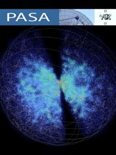
PUBLICATIONS OF THE ASTRONOMICAL SOCIETY OF AUSTRALIA
Exploring the Frontiers of Astronomy and Beyond.Publications of the Astronomical Society of Australia, published by Cambridge University Press, stands as a distinguished platform for advancing knowledge in the realms of Astronomy, Astrophysics, Space, and Planetary Science. Hemmed in the United Kingdom, this journal is recognized for its outstanding contributions, reflected in its status as a Q1 journal in both Astronomy and Astrophysics, along with Space and Planetary Science categories as of 2023. With a solid impact factor, it ranks impressively at #23 within its Scopus category, firmly placing it in the competitive 75th percentile. This publication facilitates open discourse and innovative research from its inception in 1996 to the present year of 2024, providing an essential resource for researchers, professionals, and students eager to deepen their understanding of cosmic phenomena. By embracing rigorous peer-review standards and a commitment to scholarly excellence, the journal not only contributes to the scientific community but also fosters the next generation of astronomical research.
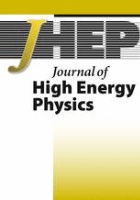
JOURNAL OF HIGH ENERGY PHYSICS
Empowering researchers with cutting-edge discoveries in physics.JOURNAL OF HIGH ENERGY PHYSICS, published by SPRINGER, stands at the forefront of research in the fields of nuclear and high energy physics. With an impressive impact factor and a Scopus ranking of #5 out of 87 in its category, it sits comfortably in the 94th percentile of academic journals worldwide. Since its inception in 1997 and transitioning to Open Access in 2014, the journal has committed itself to the dissemination of peer-reviewed, cutting-edge research that fosters collaboration and innovation across the global scientific community. Located in Germany and reaching audiences worldwide, the journal aims to provide a platform for scholars and researchers to share their findings, thus propelling advancements in theoretical and experimental physics. As it converges into 2024, the JOURNAL OF HIGH ENERGY PHYSICS continues to be an essential resource for anyone engaged in this dynamic field of study.
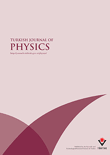
Turkish Journal of Physics
Fostering collaboration in groundbreaking research.Turkish Journal of Physics, established in 1994 and published by the Tubitak Scientific & Technological Research Council Turkey, is a prominent platform for the dissemination of innovative research in the field of physics and related areas. With an ISSN of 1300-0101 and an E-ISSN of 1303-6122, this journal has carved a niche in the academic community, evidenced by its ranking within the Q3 category in the 2023 evaluation of Physics and Astronomy. As it converges its published works toward the year 2024, researchers and scholars are encouraged to engage with its rich repertoire of studies that covers general physics and astronomy, currently holding a Scopus rank of #96 out of 243, placing it in the top 60th percentile. The Turkish Journal of Physics serves as a vital resource for advancing knowledge, fostering collaborative research, and providing insights into contemporary advancements in the discipline. While it operates under a subscription model, the quality and impact of its peer-reviewed articles make it an essential read for professionals and students alike, looking to stay informed on critical developments within the physics community.

Physics of the Dark Universe
Advancing Knowledge in Dark Matter and EnergyPhysics of the Dark Universe is a premier academic journal published by Elsevier, dedicated to advancing the understanding of dark matter, dark energy, and their implications for the universe. With its ISSN N/A and E-ISSN 2212-6864, the journal has established a notable presence since its inception in 2012, operating out of Amsterdam, Netherlands. As evidenced by its impressive impact factor and its ranking in the top quartile in both Astronomy and Astrophysics (Q1) and Space and Planetary Science (Q1) categories for 2023, this journal is a vital resource for researchers and practitioners within these fields. In the latest Scopus ranks, it ranks #12 out of 104 in Earth and Planetary Sciences and #13 out of 90 in Physics and Astronomy, placing it in the 88th and 86th percentiles respectively, underlining its academic significance. The journal is not Open Access, yet it plays an essential role in disseminating high-quality research that pushes the boundaries of knowledge about the cosmos and its most enigmatic components. Researchers, professionals, and students interested in the forefront of astrophysics will find this journal an indispensable tool for staying abreast of emerging discoveries and ongoing debates.
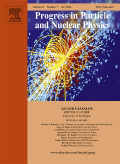
PROGRESS IN PARTICLE AND NUCLEAR PHYSICS
Unveiling the Mysteries of the Subatomic WorldPROGRESS IN PARTICLE AND NUCLEAR PHYSICS is a prestigious academic journal published by Elsevier, focusing on the dynamic fields of particle and nuclear physics. Established in 1978 and continuing through 2024, this journal is recognized for its significant contributions to the scientific community, holding a Q1 ranking in Nuclear and High Energy Physics and topping the Scopus ranking in its category. With an impactful platform that encourages the dissemination of groundbreaking research, it attracts a diverse readership of researchers, professionals, and students eager to explore the latest advances in these fields. The journal is headquartered in Amsterdam, Netherlands, and provides an essential resource for those seeking to understand complex phenomena in particle and nuclear science. Although it does not offer Open Access options, it continues to uphold a reputation of excellence and rigor, making it a vital source of information in its domain.

Journal of Cosmology and Astroparticle Physics
Fostering Collaboration for a Deeper Cosmic UnderstandingThe Journal of Cosmology and Astroparticle Physics (ISSN: 1475-7516) is a premier publication in the field of astronomy and astrophysics, dedicated to advancing our understanding of the cosmos through innovative research. Published by IOP Publishing Ltd in the United Kingdom, this journal has established itself as a vital resource for researchers, professionals, and students alike, with an impressive Scopus rank of #11/90, placing it in the top 12% of its field. The journal aims to foster the dissemination of groundbreaking studies related to cosmology, dark energy, particle physics, and the universe's fundamental structure, making it a key player in shaping contemporary astrophysics discourse. With a Category Quartile of Q2 as of 2023, it continues to attract high-quality contributions that enhance scholarly dialogue. As an accessible platform, it engages a diverse audience interested in the frontiers of astrophysical research, encouraging collaboration and knowledge sharing among the global scientific community.

INTERNATIONAL JOURNAL OF MODERN PHYSICS A
Fostering collaboration in the realms of astrophysics and high energy physics.INTERNATIONAL JOURNAL OF MODERN PHYSICS A, published by WORLD SCIENTIFIC PUBL CO PTE LTD, stands as a pivotal platform in advancing the frontiers of research within the fields of Astronomy and Astrophysics, Atomic and Molecular Physics, and Nuclear and High Energy Physics. Established in 1989, this journal has systematically contributed to the scientific community, with a demonstrated impact as indicated by its Q2 category rankings across these critical disciplines in 2023. Researchers and professionals are encouraged to engage with its rigorous peer-reviewed content, fostering a deeper understanding of modern physics theories and experimental breakthroughs. Although the journal operates under a conventional access model, it remains a vital resource for those seeking to disseminate their findings and stay abreast of cutting-edge developments. With an emphasis on quality and breadth of research, the journal continues to attract submissions from leading physicists and scholars, enhancing its reputation as a key academic resource.
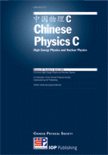
Chinese Physics C
Elevating Knowledge in Nuclear and Astrophysical SciencesChinese Physics C is a premier, peer-reviewed journal published by IOP Publishing Ltd, dedicated to advancing knowledge in the fields of Astronomy and Astrophysics, Instrumentation, and Nuclear and High Energy Physics. With an impressive impact factor reflecting its standing in the Q1 quartile across multiple categories, this journal serves as a vital resource for researchers, professionals, and students seeking to engage with cutting-edge developments and experimental findings. Since its inception in 2008, Chinese Physics C has fostered significant collaborations and discussions within the global physics community, enabling easy access to high-quality research through its open access options. Operating from the United Kingdom with a commitment to excellence, this journal not only showcases high-impact papers but also encourages innovative methodologies and interdisciplinary approaches, solidifying its role as an essential platform for dissemination and dialogue in the rapidly evolving landscape of physics.